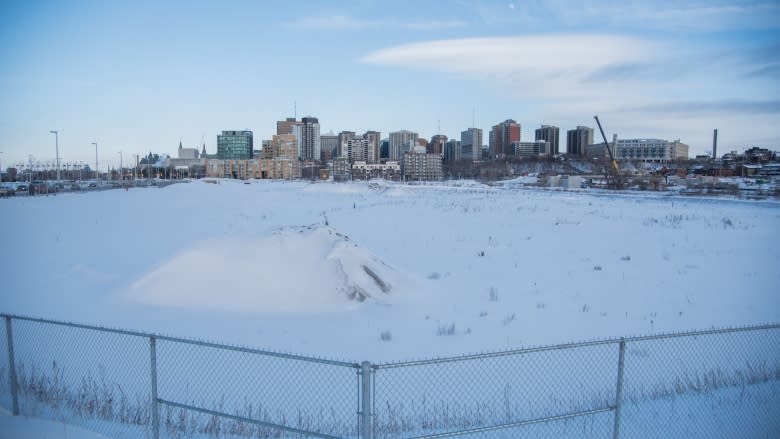Quebec Algonquin chief wants communities to benefit from LeBreton development
The chief of an Algonquin community north of Ottawa says his community filed an Aboriginal title claim this week for downtown lands not because it wants to displace Parliament Hill or the Supreme Court, but because it wants a say in future developments.
"It's about LeBreton," said Jean-Guy Whiteduck, chief of the Kitigan Zibi community near Maniwaki, Que. "It's about the whole development taking place in the region with limited benefits to our people."
A couple of major projects are on this horizon just west of the parliamentary precinct in Ottawa.
A private developer Windmill has taken over property straddling the Quebec and Ontario sides of the river, on land many Algonquin people deem sacred, with the intention of building a community of condos, shops and offices.
Windmill has been in talks with the National Capital Commission to swap small federal parcels on Albert and Chaudière Islands and on the Gatineau riverfront.
But Whiteduck said he is more concerned with the NCC's plan to redevelop prime federal lands at LeBreton Flats.
The NCC is currently negotiating with RendezVous LeBreton Group, a team that includes the Ottawa Senators hockey franchise, to try to reach a deal.
Ontario's Pikwakanagan First Nation has already said it would like to see 'significant benefit' from the redevelopment, and Whiteduck said money should also flow to nine Algonquin communities in Québec, including some remote northern ones, in order to raise people out of poverty.
"We should be equal partners in all this. Not just being left aside, saying 'Go on your reserve, collect your welfare cheque and shut up,'" said Whiteduck.
"I don't think we're ready to do that anymore and our younger generation is definitely not ready to do that anymore."
Both RendezVous LeBreton Group and Windmill Developments declined to comment.
Meanwhile, the NCC offered this statement: "The NCC fosters regular and ongoing dialogue with First Nations' leaders on a wide range of projects and will continue building on this progress going forward. The NCC cannot comment on the recent judicial claim as it is before the courts."
'The border is not our border'
Kitigan Zibi's claim, filed Dec. 7 in Ontario Superior Court, was a move intended to counter the agreement-in-principle their Ontario neighbours reached with the federal and Ontario governments less than two months ago over a massive land claim deal two decades in the making.
Whiteduck and other chiefs in Quebec say it's not just up to Ontario Algonquins to negotiate title to land in Ottawa.
"The border is not our border," said Whiteduck of the Ontario-Quebec boundary on the Ottawa River.
He and chiefs like Harry St. Denis, chief of Wolf Lake First Nation in Quebec, say the province's nine Algonquin communities have plenty of historical proof that the Ottawa River and its downtown islands were the heart of Algonquin territory.
"My community, for example, Wolf Lake, has interests on the Ontario side. So does Kebaowek, so does the Temiskaming First Nation," said St. Denis.
A key negotiator for the Algonquins of Ontario told CBC News the group would speak on the Quebec Algonquins' claim at a later date.
The Quebec chiefs said they hoped their land title claim would force the federal government to take seriously the question of who should benefit from lands in Ottawa's downtown core.
"They're title lands, never extinguished. And the governments go around saying — I've heard Mr. Trudeau say 'unceded Algonquin lands'. Well, 'unceded Algonquin lands' is a nice word but the reality is we have ownership and therefore the owners want their rightful place in all of this," said Whiteduck.



